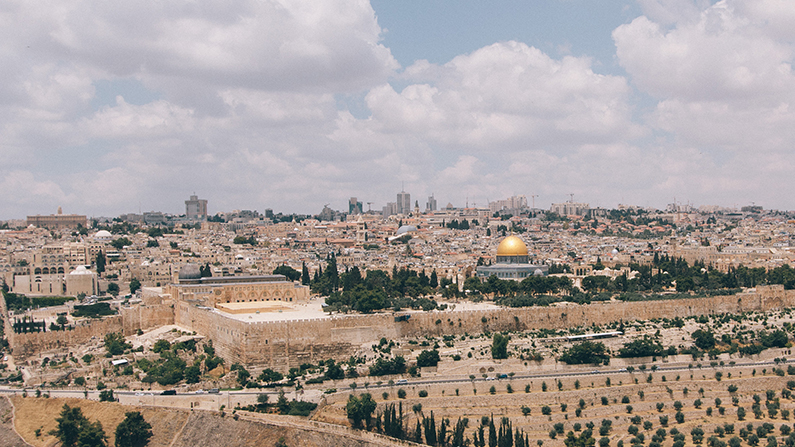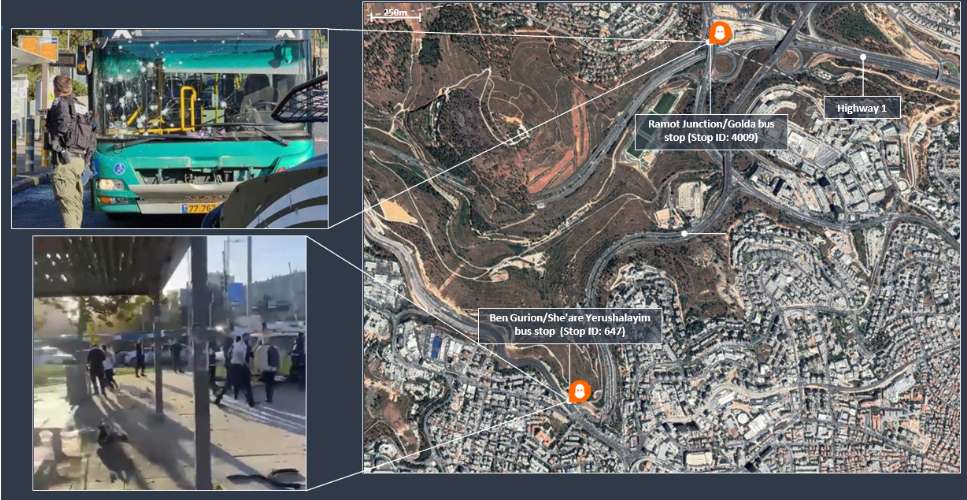Evacuations from High-Risk Locations Call +44 (0)1202 308810 or Contact Us →
Alert Plus: Jerusalem Explosions

Situation Summary
On 23 November at around 07:00 to 07:30 local time, two explosions impacted the city of Jerusalem. Both explosions occurred at bus stops located in the Givat Shaul (stop ID: 647) and Ramot Junction (stop ID: 4009) entrances to the city. The geolocated site of the Givat Shaul explosion is situated less than 2km from the Knesset and Supreme Court, whilst the Ramot Junction explosion occurred close to the Ramot Alon Jewish settlement.
At least one person was killed and 17 people were injured during the first explosion at Givat Shaul, whilst the second explosion at the Ramot Junction injured a further five people and damaged a public bus located in the area. The Shaare Zedek Medical Center and Hadassah Mount Scopus Medical Center received injured persons from the twin explosions. The individual killed in the combined blasts has been identified as Aryeh Schopek, a 16-year-old Canadian citizen who lived in the Har Nof neighborhood of Jerusalem and attended a local yeshiva.
Initial reports indicate that two improvised explosive devices (IEDs) concealed in bags were responsible for the explosions. Both bags were left at bus stops during the busy hour of the early morning commute. Israeli police later confirmed that the explosions were being treated as a suspected combined terror attack conducted by a “Palestinian” individual or organisation. No independent verification of the claim of suspected Palestinian responsibility for the attack was immediately identifiable.
Police Commissioner Kobi Shabtai confirmed that an investigation into the attack was underway and did not rule out the possibility of multiple suspects. New anti- terror measures were also announced in the aftermath of the attack, including the deployment of police officers with sniffer dogs to all buses in Jerusalem to search for any as-of-yet undiscovered IEDs. Road closures have also been implemented, including a suspension of incoming traffic along Highway One which connects Jerusalem and Tel Aviv.
Outgoing Prime Minister Yair Lapid organised a national security meeting in Tel Aviv at 12:00 local time in response to the attack. Benjamin Netanyahu, the former and incoming prime minister, called for a “strengthening [of] the hands of the security forces” engaged in front-line anti-terror operations in the aftermath of the attack.
Solace Global Comment
Attacks on civilian infrastructure occur with some frequency in Israel, and buses have been targeted on multiple occasions over the past three decades. In 2022 alone, multiple terror attacks have occurred in Israeli territory, such as a mass shooting at a bus stop in Hadera in March, a mass stabbing and vehicle-ramming attack in Beersheba in March, a mass shooting in the Bnei Brak district of Tel Aviv in March, and a mass stabbing in El’ad in May. Palestinian and Islamist terror groups are often attributed with responsibility for many of these attacks, even when there is no official claim.
Though no group or organisation has claimed responsibility for the combined attack in Jerusalem, public attention has turned to Hamas. Mohammad Hamada, a Hamas spokesperson, issued a statement claiming that the “coming days will be intense and more difficult for the enemy” and that “the time has come for the creation of cells that are spread all over Palestine”. The discovery of an IED at the light rail tracks near the Jerusalem Central Bus Station during the evening hours of 22 November has raised concerns that the twin bomb blasts may have originally been intended as a triple, or even larger, attack. Further attacks remain likely in the short term.
At the time of writing, police reports indicate that the IEDs used by those responsible for the combined attack were packed with nails and likely remotely detonated. This method increases lethality despite the likely low-yield of the IEDs themselves, impacting civilians and surrounding infrastructure with metallic shrapnel. Security forces are certain to engage in an extensive investigation into the attack, and Israel Defence Forces (IDF) incursions into both Gaza and the West Bank are almost certain to occur in the short- term as Israeli authorities seek retribution for the terrorist incident. The explosions came as Netanyahu finalizes agreements with allies to form a new right- wing government that is set to include members of religious and far-right parties. Itamar Ben-Gvir, the head of the Otzma Yehudit political party and Netanyahu’s pick to be the next Minister of Public Security, visited the scene of the first attack and endorsed an aggressive response, calling for the government to “lay siege” to the culprits “even if it’s in the West Bank”. Ben-Gvir’s comments also endorsed house-to-house searches to locate those responsible for the attack with the intention of restoring the “deterrence power” of the Israeli government.

Solace Global Advice
- In the event of a terrorist attack those in the area are reminded to RUN – HIDE – TELL – FIGHT
- Israel has a high risk of terrorism. Further attacks remain likely in the short term, although the presence of additional security force personnel in Jerusalem will likely mitigate the risk of follow-on attacks in the immediate term
- Individuals with planned travel to Jerusalem are advised to reconfirm itineraries and expect localised travel disruption, particularly in the immediate vicinity of the incidents
- Travellers are advised to avoid the immediate vicinity of Givat Shaul and Ramot Junction as emergency services remain on the scene to conduct their investigations
- Further terror attacks in Jerusalem are likely to be indiscriminate, using explosives, bladed weapons, vehicles, and firearms to target crowded areas, government or security force installations and personnel, civilians, transportation networks, the Old City, and other high-profile locations including sites of religious significance
- Locations where large groups of residents or tourists are known to gather are at higher risk of attack. You should be particularly vigilant in these areas and follow any specific advice or guidance from the local authorities or security personnel
- Exercise increased caution, remain vigilant, be aware of your surroundings and report any suspicious activity or items to security personnel as soon as possible
- If caught in the vicinity of a security incident, seek immediate hard cover from any incoming gunfire or explosions and leave the area if safe to do so. Continue to adhere to all instructions issued by authorities and obey any security cordons in place
- Monitor the Solace Secure platform and trusted local media for updates